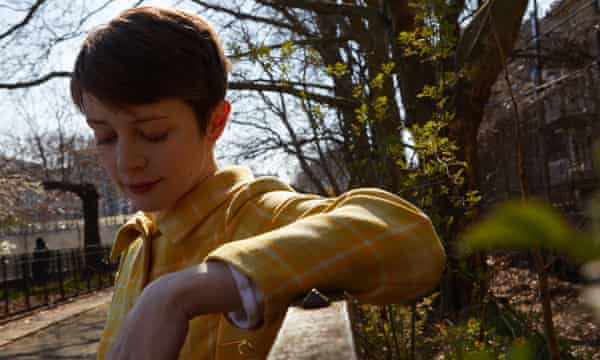 Emily St John Mandel. Photograph: Mike McGregor/The Observer Mixing cocktails in the hotel legal profession is adrift Vincent, a young woman marking meter in her distant hometown, a stifling place with one road and “ two dead ends ”. Her best friend drives the hotel boat ; her brother, Paul – aspiring composer, recovering addict – sweeps the floors. Vincent has a “ very particular give ” : she ’ s a lissome social chameleon. When newly widowed Alkaitis orders a swallow, Vincent is who he needs her to be. Alkaitis then requests her company in exchange for “ the exemption to stop thinking about money ”. The key to the kingdom are hers, but not for retentive. The time of plummeting stock prices and collapsing banks is approximate.
Emily St John Mandel. Photograph: Mike McGregor/The Observer Mixing cocktails in the hotel legal profession is adrift Vincent, a young woman marking meter in her distant hometown, a stifling place with one road and “ two dead ends ”. Her best friend drives the hotel boat ; her brother, Paul – aspiring composer, recovering addict – sweeps the floors. Vincent has a “ very particular give ” : she ’ s a lissome social chameleon. When newly widowed Alkaitis orders a swallow, Vincent is who he needs her to be. Alkaitis then requests her company in exchange for “ the exemption to stop thinking about money ”. The key to the kingdom are hers, but not for retentive. The time of plummeting stock prices and collapsing banks is approximate.
Read more: 15 Mystery Series That’ll Keep You Guessing
The future is restless in The Glass Hotel, impatient and clamant : it interrupts the present to tether consequences to actions, ends to beginnings. Alkaitis, we learn, will die in prison ; Vincent will drown. What are we to make of these future echoes ? They are not warnings it seems, but hauntings. “ There are so many ways to haunt a person, ” Mandel writes, “ or a life. ” The Glass Hotel is crowded with phantoms : lost mothers ; wronged victims ; a “ ghost fleet ” of evacuate container ships ; a beyond-the-grave curse scrawled in acid. In his medium-security cellular telephone, cussed Alkaitis conjures a apparitional “ counterlife ” sol intoxicating the actual world loses form, a deluxe dreamscape with no extradition treaty. It ’ s a juggle conceit : the global fiscal crisis as a ghost story. As one of Alkaitis ’ s employees reflects of a victimize investor : “ It wasn ’ thyroxine that she was about to lose everything, it was that she had already lost everything and barely didn ’ thymine know it yet. ” But Mandel ’ s abiding literary fascination is even more elemental : international relations and security network ’ triiodothyronine every moment – coiled with possibilities – its own touch floor ? Isn ’ triiodothyronine every life a counterlife ?
Read more: Frederick II – Trials and lessons
Like Joshua Ferris ’ south And then We Came to the end, a cardinal section of The Glass Hotel is voiced by a collective workplace “ we ” – a mea culpa chorus of Alkaitis ’ south underlings. “ We had crossed a line, that much was obvious, ” they tell us, “ but it was unmanageable to say late precisely where that tune had been. ” Mandel is not concerned in righteous shock, she ’ second concerned in that illusive line, how it is possible “ to both know and not know something ”. But there ’ s a hallucinatory, fairy-dust shininess to The Glass Hotel that makes the real universe cruelties of 2008 feel as distant and nonnatural as the transparently symbolic ( and symbolically crystalline ) hotel. here is a kingdom of kingdoms, palaces, and “ the shadowlands ”, which is how Mandel characterises american poverty : “ a country located at the border of an abyss … a territory without consolation or room for erroneousness ”. The lyric of emblem can illuminate, but it can besides be a imprint of disguise. It does both in this novel. With its shatter narrative, the rejoice of The Glass Hotel are participatory : assemble together the connections and intersections of Mandel ’ s human mapmaking, a treasure map ripped to pieces. But it is as a apparitional sequel to Station Eleven that The Glass Hotel stumbles into poignance, as pre-pandemic fiction. All contemporaneous novels are now pre-pandemic novels – Covid-19 has scored a line across our acculturation – but what Mandel captures is the last blissful pant of complacency, a knowing portrayal of the end of unknowing. It ’ s the world we inhabited mere weeks ago, and it inactive feels so tantalisingly near ; our ache for it still excessively raw to be described as nostalgia. “ Do you find yourself screen of secretly hoping that civilization collapses … Just so that something will happen ? ” a ally asks Vincent. Oh, for the freedom of that kind of heedless longing . The Glass Hotel is published by Picador in ebook and sound recording on 30 April and hardback on 6 August.


